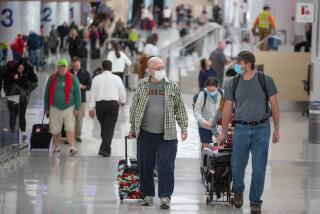Travel Briefcase: Long flight delays decline dramatically
- Share via
U.S. flights delayed three hours or more have declined dramatically over the last year, with the latest report showing a drop from 82 flights in April 2009 to only four this April.
Airline representatives say the industry has been working to reduce such delays for some time. But critics wonder.
Passenger rights activists believe the decline has something to do with the new fines imposed by the Obama administration against airlines that leave passengers sitting on a tarmac for three hours or more. The fines of up to $27,500 per passenger were adopted in December and took effect April 29.
“Clearly it’s a factor,” said Brandon Macsata, executive director of the Washington-based Assn. for Airline Passenger Rights.
But airline representatives say they were trying to reduce such delays long before the fines were adopted.
“We’ve been making progress for more than a year by self-imposed initiatives,” said David Castelveter, a spokesman for the Air Transport Assn., a Washington trade group that represents the nation’s largest airlines.
The number of lengthy flight delays has not shown a consistent pattern recently.
In November, only four flights were delayed three hours or longer. That number jumped to 35 flights in December, 21 in January, 61 in February and 25 in March, according to the Bureau of Transportation Statistics.
The nation’s largest air carrier, Delta Air Lines, had 24 flights delayed more than three hours in April 2009, compared with only one this April, the latest month analyzed by the bureau.
Delta spokesman Anthony Black said the primary reason for the drop was improved weather.
“The better the weather, the fewer delays and the fewer complaints we get,” he said.
Hotels test faster check-in technology
Despite a slump in demand for hotel rooms, many hotel companies are investing in ways to make the check-in process faster.
The InterContinental Hotels Group, one of the world’s largest hotel companies, plans to test a digital application that can turn your cellphone into your room key.
Under a test program set to begin this month, guests at two hotels, one in Chicago and one in Houston, will be able to download an application to their phone.
Once guests get a code from the front desk, their phones can play a tone that opens the sound-activated locks on the doors to their rooms. Under a second phase of the program, guests will be able to get the code sent directly to their phone, eliminating the need to stop by the hotel’s front desk altogether.
“At the end of the day, it’s a project driven by what our guests want,” said Bryson Koehler, an InterContinental spokesman.
Airlines and peanut allergies
While proposing several new airline rules last week, the Obama administration requested comments on how airlines should accommodate passengers with peanut allergies.
The Department of Transportation offered three alternatives: An outright ban of peanuts on all major airlines, a peanut ban on specific flights carrying passengers with peanut allergies or a “peanut-free zone” created on planes around passengers with peanut allergies.
“What the DOT is doing is very smart,” said Chris Weiss, a spokesman for the Food Allergies and Anaphylaxis Network, a nonprofit health organization in Fairfax, Va. “They need to bring everyone to the table.”
About 3.3 million Americans are allergic to peanuts and tree nuts. As a result, some airlines, including American and United, refrain from serving peanuts on board.
Patrick Archer, president of the American Peanut Council, wonders why the government is targeting peanuts and not other foods that can cause allergic reactions, such as cheese and eggs.
“This is not an effective way to address the overall food allergy problem,” he said.
Southwest Airlines, the low-fare carrier that served 90 million bags of peanuts last year, has already adopted a procedure to address passengers with peanut allergies, said airline spokeswoman Whitney Eichinger.
If a passenger notifies the airline in advance, she said, Southwest will not offer peanuts on that flight, replacing them with an alternative, such as pretzels.
But because so many peanuts are consumed on each flight, Eichinger recommends that people with peanut allergies fly early in the day, when peanut residue on the plane is at a minimum.
More to Read
Sign up for Essential California
The most important California stories and recommendations in your inbox every morning.
You may occasionally receive promotional content from the Los Angeles Times.











